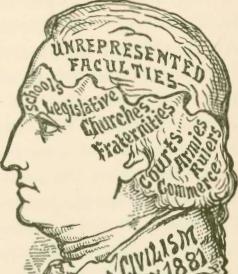It is evident that the
faculty of memory in each member creates the want and makes that member willing to unite with the rest to select one person as secretary or recorder, that he may remember for the society by keeping its records. In doing this work he is
filling a natural function a ,.._' -warn
of the organ of memory
as much as when he is
remembering or noting a fact, privately for himself. And so, too, the treasurer fills a natural function of the organ of economy when he is caring for the public funds. If the members had no organs of memory and economy, then they would never think of having a secretary or a treasurer. They would not be conscious of any such wants. Thus each officer really corresponds to some leading mental faculty.
A DUAL PHASE OF ACTION thus belongs to every
mental faculty. One phase relates to our private, individual life. The other phase relates to our work and association with others in the collective actions of society. This latter phase is centered in the duties of the officers. The psychologists, scientists, and phrenologists have overlooked or omitted all these functions of the mental faculties which produce collective wants and lead to institutions.
CIVILISM IN 1881. A critical and extended examination of all institutions up to the year 1881
OLD AND NEW FORMS. 53
proves that they have left unrepresented all of the
collective wants from the upper and nobler half of the
brain. This is marked in the initial engraving on
page 52. That is the best result that mere human
experience and the light of history could give.
For three thousand years the statesmen undertook to learn these collective wants by the light of experience. They studied history with great diligence. They knew the conduct of men. The proud result of all their vain labor is summed up in our engraving of civilism. Their method itself was essentially imperfect. And they discovered less than half of the wants of man.
The statesmen knew, as Blackstone says, that "The wants of individuals are the natural foundations of society." But they had no standard of completeness. In a disconnected way they multiplied institutions and officers by the hundreds. Thus we find state and municipal governments, legislators, senates, councils, cabinets, bureaus, agricultural societies, literary and scientific associations, public and private schools and colleges, art societies, fraternal and secret lodges, labor unions, railway companies, fighting armies, etc. Each of these has a board of officers, numbering from three up to forty.
With all this complication one would think that nothing should be left out. Yet the result was the vast deficiencies we have already noted. To imitate the past was to work after very imperfect copies.
The statesmen knew the outside of men. That was like studying the outside case of a watch. You could not learn its mechanism; could not learn to
HISTORIC GROWTH OF MAN.
